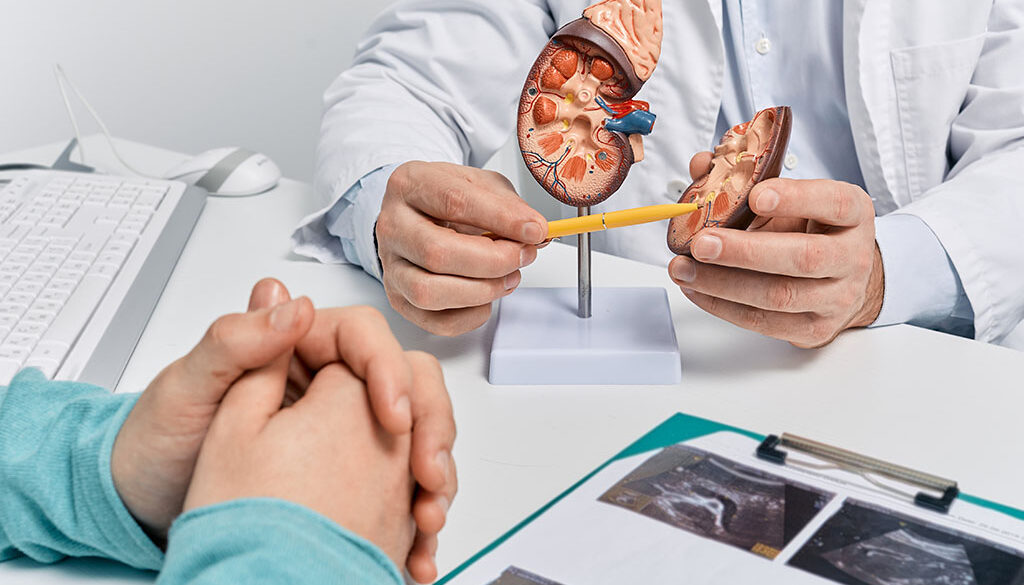How Long Does It Usually Take to Pass a Kidney Stone?
When you have a kidney stone, it’s difficult to focus on anything other than the extreme discomfort it causes. These stones can range in size from a grain of sand to as large as a ping pong ball (although kidney stones that large are not common). How long does it take to pass a kidney stone? That depends upon several factors, including the size of the stone.
We’ll review how long it takes to pass a kidney stone, signs that one is about to pass, and what you can do to help expedite the process. In addition, we’ll discuss how our internal medicine physicians in Raleigh can help you avoid kidney stones through some simple modifications.
How Long Does It Take to Pass a Kidney Stone?
This all depends upon the size of the stone. Smaller stones, typically those less than 4 millimeters, pass within one to two weeks. Larger stones can take much longer–sometimes as much as three— weeks to pass.
How Can I Pass a Kidney Stone Faster?
To speed up the process, and discover how long it takes to pass a kidney stone, you should consider the following:
Remain Hydrated
Drinking a lot of water can not only help flush out the stone, but in many cases, it can prevent developing others.
Engage in Physical Activity
You may not feel like delving into your regular exercise routine—and that’s okay—gentle physical activity such as walking can help move the kidney stone along.
Adjust Your Diet
Avoid foods that are high in oxalates. Oxalates are substances that are found in foods such as spinach, almonds, and rhubarb. While these don’t cause problems for many people, those who are predisposed to developing kidney stones should avoid these foods. Fruits, vegetables, and whole grains are better choices.
How Do You Know When a Kidney Stone is About to Pass?
When your kidney stone is about ready to pass, you may experience:
Shift in Pain
While kidney stones cause pain in the lower abdomen or back, this discomfort often travels to the groin as the stone moves through the urinary tract.
Increased Urination
You’ll feel a need to urinate more frequently and even have a strong urge to urinate.
Blood in Urine
When you pass a kidney stone, small amounts of blood may appear in your urine.
Pain Relief
Typically, you’ll feel relief from the intense pain and discomfort of kidney stones. This is a sign that it has passed.
How Do Kidney Stones Form?
Kidney stones form when substances in the urine—such as oxalate, uric acid, and calcium—crystalize. While anyone can form kidney stones, certain groups are at much higher risk for developing them. Those at higher risk include:
- Those with a family history of kidney stones
- Males are more likely to develop a kidney stone (11% (males) vs. 6% females)
- Those who are dehydrated
- Those who eat a high-sodium diet
- Those who are overweight or obese
- Those with digestive tract diseases such as IBD
How Do You Keep Kidney Stones From Forming?
First, if you fall into any one of the risk groups listed above, try to make changes when possible. For example, if you’re overweight, strive to lose weight or have a low-sodium diet.
The following tips can also help you keep kidney stones from forming:
- Remain hydrated
- Eat a moderate amount of protein
- Reduce salt intake
- Get regular exercise
- Eat a balanced diet
Let Our Internal Medicine Physicians in Raleigh Help You on Your Journey to a Healthier Tomorrow
How long does it take to pass a kidney stone? As we discussed, a lot of it depends upon the size of the stone and what you do to help it move along the urinary tract. If you feel you may have developed a kidney stone, please notify the office as soon as possible. Our experienced practitioners can help with testing/diagnosis as well as treatment of the discomfort usually associated with this health condition.
Your overall well-being is vital to prevent not only kidney stones but other health issues. Our leading internal medicine doctors in Raleigh have been vital members of the community for decades. We can help you develop a comprehensive plan that will reduce the likelihood that you’ll develop kidney stones—particularly if you fall into one of the high-risk groups.
Ready to live a healthier life? Start your journey by scheduling an appointment today.

